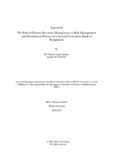The role of human resource management in risk management and recruitment process of a second-generation bank of Bangladesh

View/Open
Date
2023-04Publisher
Brac UniversityAuthor
Simanto, Mir Shakrul AlamMetadata
Show full item recordAbstract
HRM affects risk assessment for organizational culture, personnel acquisition and retention, output, ethics, morale, disputes, absenteeism, health and safety, sabotage or corruption, workplace violence, and regulatory compliance. Business decisions effect employees' health and lifetime. Maslow's hierarchy of desires evaluates HRM and employee satisfaction. Talents—human capital choices—must be crucial to recruitment for long-term success.
Dhaka bank hr practitioners should discover talent and highlight instances where human capital fits corporate objectives.HR risk management requires effective management, communication, training, motivation, conflict resolution, and evaluation. Clear regulations, competent management, and Dhaka bank hr compliance are essential. HR risk may be reduced through firm property destruction, password changes, data management, and exit interviews.
DBL need leadership, communication, training, motivation, dispute resolution, and evaluation. HR departments must conduct regular legal audits, designate an employee to monitor employment law changes and high-profile court cases, educate employees and coordinate IT to secure sensitive data, and have compliance and security documents and procedures reviewed by specialists or employment law attorneys to ensure compliance. Dhaka Bank's HR department recruits at universities and offers a hiring letter containing the role, rank, pay grade, and start date. Orientation leads to the Basic Banking Training Program.
